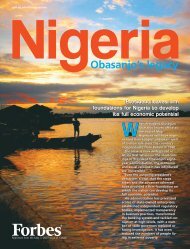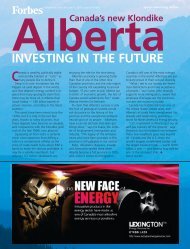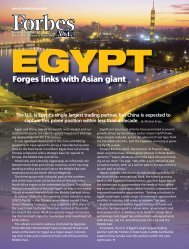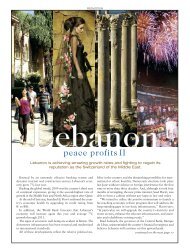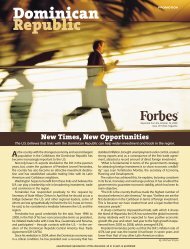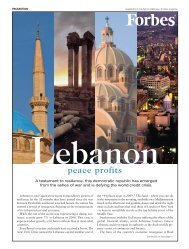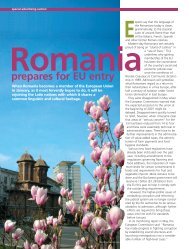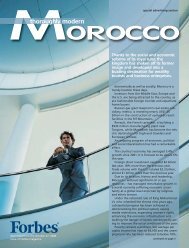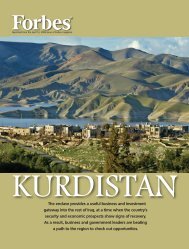Turkey
Spotlight on Opportunity - Insight Publications
Spotlight on Opportunity - Insight Publications
- No tags were found...
You also want an ePaper? Increase the reach of your titles
YUMPU automatically turns print PDFs into web optimized ePapers that Google loves.
special advertising section<strong>Turkey</strong>Spotlight on OpportunityMany countries claim to be abridge between regions,cultures or markets. Fewcan make a stronger claimthan <strong>Turkey</strong>, whose geographicallocation at the crossroads ofEurope and Asia has dramatically shapedthe country’s history.“Modern <strong>Turkey</strong> is the result of a1,000 years’ journey, which took usfrom the deserted steppes of CentralAsia up to the doors of Vienna,” saysNazan Olcer, director of the SabanciMuseum in Istanbul. Along the way theTurks picked up and deposited fragmentsof languages, religions and socialcustoms that have made <strong>Turkey</strong> aunique blend of European and Asiancultures and a crucial geopolitical pivotbetween the two continents.While <strong>Turkey</strong> has often stumbledalong the way – sometimes even collapsing– its people have always pickedthemselves up again. Over the last twodecades alone, the country has recoveredfrom a virtual civil war in the mainlyKurdish southeast, two major earthquakesand the worst economic crisis inthe republic’s history. Its latest greatescape took place during the governmentof Prime Minister Recep TayyipErdogan, who led the moderate IslamicAKP party to power in 2002. Inflationhas been curbed from the alarming80% registered during the economic crisisin 2001 to a far more manageable10%, while structural reforms – inspiredby Turkish aspirations to enter theEuropean Union (EU), and backed by a$16 billion loan from the InternationalMonetary Fund (IMF) – have helpedincrease market confidence and encourageddomestic and foreign investment.Although the economy experienced aslowdown in the second half of 2006,gross domestic product for the year grewby 6%, a rate unmatched by any EUcountry. Moreover, the AKP has earnedthe reputation of being honest and hasgained the approval of the business community,many of whom are not theparty’s natural supporters. “We haveseen a lot ofboom and bustcycles in ourrecent history,”says Dr. RuscluSaracoglu, CEOof Yapi Kredi,one of thelargest privatebanks in <strong>Turkey</strong>,and former governorof the centralbank, “but the fact thatthe government has stuck to the recoveryplan as laid down by the IMF makesus much more confident about thefuture.”Stability and sound fiscal policies arethe key words in Istanbul’s financial circles.However, the IMF’s fourth review ofthe standby arrangement recommendsthat <strong>Turkey</strong> contain its current accountdeficit and stabilize the exchange rate tominimize the risk of falling back into oldhabits.Also, <strong>Turkey</strong> still has aspects of acountry divided in two, with theenclaves of Istanbul and Ankaraaccounting for more than 30% of thecountry’s GDP, while unemployment inthe eastern regions near the borderswith Iran and Armenia often affects asmuch as 60% of the population. Foreigninvestors may worry over imbalances inthe domestic market’s structure, as wellas growing political instability, which thisyear’s planned elections may be amplifying.“2007 may be a crucial year for<strong>Turkey</strong>, as the election of a new presi-Reprinted from the March 26, 2007 issue of Forbes
2 <strong>Turkey</strong> special advertising sectiondent in spring and subsequent generalelections in the fall will set the course ofTurkish politics for the next decade,”says Carlos Pascual, director of ForeignPolicy Studies at the BrookingsInstitution, an independent think tankbased in Washington, D.C.Whatever shape the administrationtakes after the elections, it must try toresolve what is perhaps <strong>Turkey</strong>’s biggestinternational concern: EU membership.During his visit to Ankara last December,U.K. Prime Minister Tony Blair stressed,yet again, that “<strong>Turkey</strong> is strategicallyplaced to ensure peace in the Middle Eastand it will prove to be a valuable partnerfor Europe.” For the time being, however,the negotiations seem to have reached astalemate over Cyprus – the EU insiststhat <strong>Turkey</strong> open its ports to Greek-Cypriot ships and aircraft, but <strong>Turkey</strong>refuses to do so while the embargo onTurkish-occupied territory remains ineffect. In truth, Cyprus is just one item ina long list of demands that <strong>Turkey</strong> feelsEurope has done little to address. <strong>Turkey</strong>first applied for membership in what wasthen the EEC in 1959, and since then ithas watched as 21 countries have joinedthe club while its own applicationseemed to be held at arm’s length.Clearly <strong>Turkey</strong> is a special case. By2015 its population will overtakeGermany’s, giving it more representativesin the European parliament than any ofthe existing members. Also, <strong>Turkey</strong> ispoor by European standards, and thericher EU members fear a massiveinflux of young Turks looking for jobopportunities.“The European Union is just playingwith us to keep us warm,” a taxi driverin Istanbul remarked recently, reflectingpopular opinion. Polls indicate that publicdesire for EU membership hasdropped from over 80% three years agoto well below 40%, a sign that patienceamong the Turks is running out. Yetdespite the present impasse, EU membershipseems inevitable. “It’s like bittermedicine that you better drink now ifyou want to get up in the morning,”says a foreign diplomat.Few countries are more anxious to see<strong>Turkey</strong> join the EU than the United States.The Iraq Study Group’s report has recommendedthe involvement of Iraq’s neighborsin stabilizing the region. As NATO’ssole Muslim member, <strong>Turkey</strong> is seen bymany as the only country with theauthority and the historical and culturallinks to negotiate effectively with bothIraq and Iran. While there is resentmentthat the U.S. has not sought to mitigate<strong>Turkey</strong>’s loss of billions of dollars of tradewith Iraq since the first Gulf War byrewarding Turkish firms with a larger rolein Iraq’s reconstruction, a new spirit ofco-operation seems to be prevailingbetween the U.S. and <strong>Turkey</strong>.Turks pride themselves on being citizensof the most modern nation in theIslamic world, and they could certainlyplay a vital role in projecting democraticvalues in the Greater Middle East.❖ Marco VendittiProject Managers: Sabeena Uttam, Antoine Rolin.Publisher: John Gasser, Managing Editor: Beverley Blythe,Writer: Marco Venditti, Art Director: Y. Taravilla-Marin.This special advertising feature was producedby Insight Publications, a division of Impact Media Global Ltd.53 Chandos Place, London WC2N 4HS, UK.Tel: +44 20 7812 6400 Fax: +44 20 7812 6413150 East 55th Street, 7th Floor, NY, NY 10022, USA.Tel: +1 212 751 1900 Fax: +1 212 751 0088www.insight-publications.comemail: publisher@insight-publications.com
special advertising sectionTappingPotentialIn a country where electricity pricesare among the highest in theworld and where the state oftenstruggles to meet growing demand,the business community eagerlyawaits the privatization of <strong>Turkey</strong>’selectricity network. However, thegovernment of Prime Minister RecepTayyip Erdogan seems prepared tomake the nation wait a little longerfor a liberalization of its energy market,at least until after the electionsscheduled for next November.“The government doesn’t want toaddress as vital an issue as electricityprivatization in a rush,” said EnergyMinister Hilmi Guler in January. Hisstatement casts a shadow over<strong>Turkey</strong>’s future privatization plansand may hurt its relations with theInternational Monetary Fund, whichstrongly backs the privatization.Moreover, the delay could have anegative impact on a country inurgent need of investment in electricitygeneration, as it is predictedthat existing capacity will be unableto meet rising national demand from2009 onward. In fact, <strong>Turkey</strong> maysoon experience blackouts similar tothose that led to economic losses inseveral Western countries in the pastfew years.Political strategies aside, mostinvestors agree that the Turkishenergy sector will offer top growthopportunities within the nextdecade, especially in the electricityand gas segments. The annual electricity-demandgrowth rate is projectedto be 8.5% for the decade2005-2015, while natural gas consumptionis expected to increase to60 billion cubic meters (bcm) duringthe same period. One of the world’sfastest-growing energy markets,<strong>Turkey</strong> will need approximately $130billion in investment through 2020, afigure well above the EU average.Energaz, an affiliate of GlobalInvestment Holdings, was one of thefirst Turkish companies to takeadvantage of the privatization of thegas network. “We decided to sell offthe controlling stake of our brokerageand investment banking in favorof the energy sector, which is ournext area of growth,” says groupchairman Mehmet Kutman. His experienceas an investment banker giveshim the confidence to get involved,on a project basis, in growth industriessuch as gas and electricity distribution.The company also plans toenter the electricity and gas generationmarkets in 2007.Energaz built and operates the systemconnecting the national gas gridto end users in nine regions of<strong>Turkey</strong>, mainly in central Anatolia,which accounts for 6% to 7% of thecountry’s demand. But with Botas,the Turkish national pipeline company,holding additional tenders in2007, the company is looking to penetratenew regions and increase itsshare to 10% of the market. Fortythreearea tenders have been completedto date, but the present transmissionnetwork is still far from coveringthe country as a whole.“<strong>Turkey</strong> has entered an era of economicgrowth in which peoplealready perceive certain structuralchanges as real accomplishments.But in reality, this is just the beginning,”says Kutman, musing on<strong>Turkey</strong>’s untapped potential. Energazis also considering entering the electricityand water distribution businessesin the cities where italready operates. “At the endof the road we want to createa single utility bill forend consumers,” he says.The company prides itselfon entering into partnershipswith experts in their respectivefields. In the energysector its technical partneris STFA, a diversified constructionand engineeringcompany with extensiveexperience both in <strong>Turkey</strong>and abroad. Energaz willprovide the financingand oversee investorrelations, while STFA,the operator, willimplement and managethe projectsand liaise with consumers,localauthorities andthe businesscommunity.3However, Energaz is not alone inthe rush into the energy market.Turkish companies such as KocHolding and Enka Insaat, and internationalgiants like Germany’s E.ONand Italy’s ENEL, have clearly statedtheir intentions of becoming majorplayers within the next five years.Another Turkish group increasinglyactive in the energy sector is ErenHolding, a conglomerate with interestsin paper, tourism, textile retail,cement, packaging and energy. ErenHolding boasted a turnover of $583million last year. When discussingthe energy sector, the company’sCEO, Ahmet Eren, emphasizes theadvantages of using coal in energyproduction. “We are going to be theonly Turkish private company tohave a coal-fueled power plant, asnatural gas is becoming increasinglyexpensive in the international market,”he says. “Even countries likeGermany are reopening coal minesthat have been closed for years.”Although Eren Holding is bestknown in <strong>Turkey</strong> as the producer anddistributor of well-known internationalbrands such as Lacoste,Burberry, Calvin Klein and Swatch,the group has recently completed acoal-burning thermal power stationin Zonguldak, on the Black Sea,which will become operational in thefirst half of 2007. According toZonguldak’s governor, the facilitywill provide employment forapproximately 1,500 people.Eren Holding also has aspirationsin electricity distributionand is among the 37 firms prequalifiedin the tender for threegrids to be located in Ankaraand Sakarya. “We now have severalapplications from internationalcompanies that wish toenter the Turkish energy marketin joint ventures withEren Holding,” says Eren,acknowledging that astrategic partnership willprovide his company withextra insight into theinternational capitalmarket and help securethe funds needed tokick off new projects.The ball is now firmlyon the government’sside of the court. ❖
special advertising section 5U.S. GAAP financial analysis, and I am confidentthat we can meet the requirementsof the NYSE,” Ozen states.The Turkish banking sector is still tinycompared to the economy it serves, butmany Turkish banks are growing rapidly interms of assets and market share as theyride a wave of consolidation in the sector.Vakifbank was established in Ankara in1954 with the initial purpose of managingthe cash revenues and expenditures ofcharitable foundations set up during theOttoman Empire.Following trends in the market, Vakifbankhas gone through a major transformation inrecent years. “In 2005 we launched an IPOthat was oversubscribed at a record level,with more than 35,000 investors, local orinternational, who placed demands,” saysYusuf Beyazit, the bank’s chairman of theboard. As a result of the IPO, the GeneralDirectorate of Foundations reduced its equityinterest in the bank from roughly 75% to58%, with the rest of the shares now restingin private hands. According toVakifbank’s management, this quasi-stateownershipstructure is one of the bank’sstrongest features, as it combines stabilitywith flexibility. The management admits,however, that the bank needs to diversifyfurther and target the more traditional retaildeposits and SME segments. As the nationalincome has steadily risen in recent years,institutions like Vakifbank are refocusing“There are certain criteria that you have tofulfill to attract FDI, such as political stabilityand a low-inflation environment, both ofwhich we have finally attained in <strong>Turkey</strong>.”Ergun Ozen, president and CEO of Garanti Banktheir policies inorder to pursue thebusiness of thegrowing middleclass. Thanks to thefalling cost of credit,the city streets arejammed with expensive cars, and consumergoods fill the shopping malls that are poppingup all over the country.As the expectations of <strong>Turkey</strong>’s citizensrise, so do those of institutions likeVakifbank, whose main objective is tobecome one of the three largest banks in<strong>Turkey</strong>, even though it faces direct competitionfrom world-class players like Akbank.Akbank, 34% owned by SabanciHolding, is the most profitable institution inthe country. “The Sabanci are one of themost highly respected families in <strong>Turkey</strong>,and Akbank is an ideal partner forCitigroup to broaden its international distributioncapabilities,” says Charles O. Prince,Citigroup chairman and CEO. According toAkbank’s management, this alliance willsolidify the bank’s position in the rapidlygrowing Turkish banking sector. “I believethat we will complement each other, asCitigroup has excellent product know-how,especially in private, investment and corporatebanking, while we have the largestdistribution network in <strong>Turkey</strong>,” says SuzanSabanci, Akbank’s managing director.“Ultimately what we hope to achievewith this alliance is to maximize ourshareholder values,” says Sabanci, whoadds that protecting its shareholders isone of the bank’s top priorities. “We arethe first bank in <strong>Turkey</strong> to form an independentinstitutional investors’ relationsdepartment, especially for minorityshareholders, and probably the first tohave declared our dividend policy.” ❖
6special advertising sectionGoing OnlineIn a rapidly consolidating globaltelecommunications industry, opportunitiesto enter markets with low penetrationand high growth potential arefew and far between. So when <strong>Turkey</strong>’sformer state telecom monopoly went onsale in late 2005, Saudi Arabia’s OgerTelecom seized the opportunity, paying$6.5 billion for a 55% stake in TurkTelekom. It was the country’s biggest privatizationdeal to date.“We knew that <strong>Turkey</strong> was the market.There were other countries we couldhave moved into, but it was the righttime to move into <strong>Turkey</strong>,” explains Dr.Paul Doany, chairman of Turk Telekomand CEO of Oger Telecom. Oger, whichhas pursued an aggressive acquisitionspolicy over the last five years in its bid tobecome a global player by the end of thedecade, was also attracted by the potentialof expanding broadband access to<strong>Turkey</strong>’s 20 million fixed-line subscribers.With <strong>Turkey</strong>’s population of more than70 million, the country’s communicationsmarket holds considerable potential, andin Europe is second only to Germany’s.With the country’s regulatory frameworkfor communications now shaped to conformto the EU’s regulatory framework,including provisions for promoting competition,a growing number of foreignplayers are moving in.At present, only 10% of Turkishhomes have high-speed Internet access–– around 1.5 million customers. Expertsbelieve, however, that this figure is likelyto double in the coming year, and TurkTelekom plans to invest up to $3.5 billionover the next six years to improvecabling and other related infrastructure.Oger’s vision for Turk Telekom hasprompted the company to introducecutting-edge technology, improve servicequality and increase shareholder value,policies that Doany says will transform itinto a leading operator, on a par withthe world’s best telecommunicationscompanies. To help achieve this, U.K.telecom giant BT is advising TurkTelekom on renewing and improving itsfixed-line operations. Oger has alreadybegun investing in Turk Telekom’s humanresources, and Doany believes retrainingprograms will further strengthen them.The partial privatization of Turk Telekom– the remaining 45%, owned by theTurkish Treasury, will be listed on the stockexchange – has liberalized the telecomsector. As new participants have enteredthe market, call costs have been comingdown, improving service and lowering theoverall expense for consumers.“The choice for users is predominantlybetween quality and price,” says Doany.“A single operator cannot give thesechoices convincingly.” He adds that oneof Turk Telekom’s goals is to be a fairmarketcompetitor and a good businesspartner, extending partnerships in theinterest of the consumer. “Turk Telekomwill work with the TelecommunicationsAuthority in promoting fair competitionand a level playing field within the regulatoryframework and the sector policy,”says Doany.“We knew that <strong>Turkey</strong>was the market. Therewere other countries wecould have moved into, butit was the right time tomove into <strong>Turkey</strong>.”Dr. Paul Doany, chairman of Turk Telekomand CEO of Oger TelecomThe Turkish mobile market is highlycompetitive and has strong growthpotential. Around 65% of the populationhas a mobile phone, compared with asubscription rate of over 100% in mostWestern European countries. The biggestplayer is Turkcell, which has around 60%of the market, followed by Telsim,owned by Vodafone, and Avea, in whichTurk Telekom holds a 15% stake.But mobile telephony is still prohibitivelyexpensive in <strong>Turkey</strong>. The mobilesales tax amounts to 65% of the resaleprice. The government is preparing toreduce this tax, a move that will allowcustomers to pay less without affectingthe operators’ net share of sales.Lowering what the consumer paysincreases the potential for growth in themobile sector and could affect fixed-linebusiness as well. ❖Insight Publications worked with the CarbonNeutral Company and its science partner, theEdinburgh Center of Carbon Management, tocalculate this report’s carbon footprint andimplement carbon offset projects to reduce theedition’s emissions to net zero. Global warmingemissions have been measured, reductions recommended,and the remaining emissions offsetthrough renewable energy and/or sustainableforestry projects.
special advertising section 7Homegrown EntrepreneurshipIstanbul’s streets offer opportunity.Tucked away in an industrial complexhalf an hour from the center ofIstanbul, Intercity Rent a Car’s headquartersmight be difficult to locate, butwhat’s waiting inside is definitely worththe trip.Founded in 1991 by Vural Ak, theagency is now the fastest-growing rentalcompany in <strong>Turkey</strong>, with a fleet of 10,000cars and a 20% market share. The companyhas total assets of $270 million andrealized profits of $20 million in 2006.“We are growing exponentially, and bythe end of 2007 we’ll have a fleet of12,000 cars and a net profit estimated at$35 million,” says Ak.Ak has proved to be quite adept atmaking the best of market opportunities.In the early 1990s he began renting carsto Germans summering in <strong>Turkey</strong>, and in1994, following a change in the legislationregulating financial leasing, the caragency became the first Turkish companyto provide long-term fleet rental servicesto corporations. “My first customer wasElectrolux, which is still our client today,”says Ak, whose portfolio now includesheavyweights such as Citibank, Coca-Colaand HSBC, along with other multinationalsand blue-chip Turkish corporations.Foreign investors have poured morethan $250 million in loans into the company,and Ak feels that his firm is readyfor the next phase. “We’re looking for abig brother,” he says frankly, “as we willneed roughly $500 million until 2008 toachieve our goals.” He outlines his planwith mathematical precision: “We estimatethat in the next five years the wholemarket will absorb as much as 800,000vehicles, which is 14 to 15 times morethan today’s demand; and if you look atthe market today, there are no strongplayers other than our company.” ❖
8 <strong>Turkey</strong> special advertising sectionNot Just for TouristsWith an eye on gaining membershipto the EU, <strong>Turkey</strong> hasbeen working hard in recentyears to establish a credible brand for itsnumerous and varied industries.Healthcare may well turn out to be oneof its prize assets.In the past, Europeans have passedthrough <strong>Turkey</strong> on their way to India,Hungary and, lately, Greece and Cyprusto take advantage of the highly skilledspecialists and medical facilities availablein these countries at prices far belowthose at home. Today many of these“medical tourists” are coming to <strong>Turkey</strong>itself for a variety of healthcare services.Already a name to reckon with in thefields of ophthalmology and dentistry,<strong>Turkey</strong> has a competitive advantagethat’s now attracting patients for a widerange of medical procedures. For example,a heart bypass that costs about$75,000 in Britain or in the Middle Eastcosts only $15,000 in <strong>Turkey</strong>.Besides offering significantly lowercosts, healthcare in <strong>Turkey</strong> also benefitsfrom a vast pool of science and medicalgraduates and the government’s increasingwillingness to invest in both publicand private healthcare.The country’s health expenditure hasincreased significantly over the past fewyears, from 3.7% of GDP in 1999 to 5% in2005, a higher percentage than in manycountries with similar per capita incomes.The Turkish Health Ministry is introducinga new model to facilitate cooperationbetween the public and private sectorsin the construction of hospitals. Itcalls for the government to provide theland and pay rent for up to 30 years,after which the hospital will become theproperty of the state. The investors willmanage construction, according togovernment-approved plans, and will beresponsible for hospital maintenance.This model will allow the construction ofhospitals on schedule, without delaysdue to insufficient financing.While the government’s healthcaremodel will lead to a substantial increasein the opening of new hospitals acrossthe country, a number of well-regardedinstitutions, such as the AmericanHospital of Istanbul, have been operatingin the country for some time.The hospital’s original purpose was toprovide medical services to foreign militaryunits stationed in Istanbul. In 1955the Koc Group, one of the largestfamily-owned conglomerates in <strong>Turkey</strong>,acquired the American Hospital, and thegroup’s Vehbi Koc Foundation owns ittoday. “The Koc family has beenextremely supportive of this project, andthey have invested more than $100 millionin the hospital so far,” says CEOGeorge D. Rountree.Lifetime careRun as a nonprofit organization, theAmerican Hospital offers a wide range ofservices and treats more than 120,000patients a year. It employs 279 specialists,many of them trained in the U.S.,and 1,038 support personnel. The building,located in one of the busiest commercialdistricts of Istanbul, was constructedto withstand earthquakes up toa magnitude of 9 on the Richter scale,an important architectural feature in aregion prone to violent seismic activity.When the current expansion is complete,the hospital will house 200 patient beds,some of which will enjoy a spectacularview over the Bosporus. “Our CEO“In the long run, with the assistanceof our partner, the Johns HopkinsMedical Schools, the AMC will becomea healthcare teaching hospital and areference point for the region.”Dr. Murat Dayanikli, CEO of Anadulu Medical Centerwanted the hospital’s rooms to be similarto hotel rooms, and I think we’ve managedto accomplish that,” says a tophospital manager.The American Hospital has received ISO14000 and ISO 9001 certification in compliancewith international standards andit regularly holds symposiums with hospitalsin the U.S. to recruit Turkish doctorsworking there.The Anadolu Medical Center (AMC)offers another healthcare option in<strong>Turkey</strong>. The facility has a pioneeringemphasis on preventative medicine andlifetime continuum care, with a wellnesscenter and primary care facility under thesame roof as long-term care and a combinationof education and research programs.This multidisciplinary approachfacilitates diagnosis and treatment in allof the center’s specialist departments,and differentiates AMC from other medicalfacilities in theregion.Dr. MuratDayanikli, the center’sCEO, identifiesthe crucial role ofthe primary carephysician in preventativehealthcare.“That is why ourlogo says ‘in healthand in sickness,’“he says. A Yalegraduate who hasworked extensively in the U.S., Dayanikligreatly values the AMC’s 15-year partnershipwith one of America’s leadingteaching hospitals. “In the long run,with the assistance of our partner, theJohns Hopkins Medical Schools, theAMC will become a healthcare teachinghospital and a reference point for theregion.” He also emphasizes that over35% of his staff is certified by the U.S.Medical Board.The AMC’s facilities are impressive byany standard. The campus covers 45,000square meters, has 209 beds and is surroundedby forest, enabling it to offertreatment in a peaceful environment farremoved from the city.It is equipped withcutting-edgetechnologies, includingthe CyberKnifeSystem, one of themost advanced cancertreatments available,and is already attracting attention for itsoncology, cardiovascular, neurology andgynecology departments.Dayanikli’s long-term goal is to makeAMC the best hospital in Europe, offeringstate-of-the-art services combinedwith unique Turkish hospitality, andsecure in the knowledge that science in<strong>Turkey</strong> is on par with that of Europe, theMiddle East and the rest of the world. ❖
special advertising section9The Full BenefitsAfter a series of regulatory and fiscalreforms to the banking sector,financial services companies in<strong>Turkey</strong> are poised to benefit from thecountry’s buoyant economy. The insurancesector in particular may become thefastest-growing industry in the country. “IfI were to advise a foreign investor who’slooking for brand-new opportunities overhere, I wouldn’t hesitate a moment beforesuggesting the insurance sector,” says Dr.Rusclu Saracoglu, CEO of Yapi Kredi bankand a former minister of economy andgovernor of the central bank.Although the Turkish insurance marketis still small in scale, the sector’s nominalgrowth was 24% in 2006. “As thedescendants of a 600-year-old empire,Turkish people unconsciously expect toomuch from the state,” says Mustafa Su,CEO of Anadolu Sigorta, one of the oldestand largest insurance companies in<strong>Turkey</strong>. “Add religious beliefs, and thatpretty much explains why Turkish peopleare still unaware of the full benefits ofinsurance.” While the insurance industryin general can be seen as a “Western”product, this perception is changing rapidlyamong a population that is growingwealthier by the day. Many people, likeSu, see the huge potential of tappinginto the undeveloped Turkish marketwith both life insurance and non-lifeproducts such as property and casualty(P&C). The introduction of private pensionsis also expected to draw a higherpercentage of the population into usinginsurance services.“The small and medium enterprisesthat are scattered all over <strong>Turkey</strong> will beone of our main targets in the comingyears,” Su points out.The use of the distribution channels ofIsbank, <strong>Turkey</strong>’s largest publicly tradedinstitution, adds to Su’s confidence in hiscompany’s future. “Isbank now holds a12.5% share in our premium production,but we are planning to increase it to30%. If we succeed in this operation, itwill bring us another five to ten years of“The small and mediumenterprises that arescattered all over <strong>Turkey</strong> willbe one of our maintargets in the coming years.”Mustafa Su, CEO of Anadolu Sigortaleadership in the sector,” he states.Meanwhile, global insurance giants likeHolland’s ING and America’s AIG havealready turned their attention to <strong>Turkey</strong>’sinsurance market, and the interest of foreigncompanies is expected to remainstrong through 2007. The privatization ofBasak Insurance and Basak Retirement,both acquired by the French companyGroupama, has served as an industrybenchmark and has been followed bysimilar deals such as Liberty Mutual’sacquisition of Seker. Domestic companiesneed international partners to compensatefor their lack of capital, while multinationalinsurers are in search of newmarkets that can support rapid growth.International companies also want stablepolitical and economic systems, bothof which <strong>Turkey</strong> now offers. ❖
10 <strong>Turkey</strong> special advertising sectionA Head for BusinessIn a country known for its trading andcommercial skills, few cultural icons aremore respected than the self-made millionaire.Such a businessman, SakipSabanci, arguably made the biggestimpression on <strong>Turkey</strong>’s recent collectivememory. “I don’t think so many peoplehave attended a funeral since Ataturk’sdeath,” says Nazan Olcer, director of theSabanci Museum in Istanbul, when discussingthe state funeral that Sabanci wasgranted in 2004.Affectionately known as “Sakip Agha,”an honorific title that translates roughly as“the big brother of the village,” Sabanciwas the wealthiest man in <strong>Turkey</strong> when hedied in 2004 at age 71. Patriarch of thecountry’s largest conglomerate, he was ahands-on businessman who controlledevery aspect of his empire of more than60 companies. Since his death, the conglomeratehas remained in family hands,and today two of the most importantpositions are held by his nieces: GulerSabanci is chairwoman of the group,and Suzan Sabanci is managingSuzan Sabancidirector of Akbank, the holding’s flagship.One of the mistakes commonly attributedto first-generation managers oflarge businesses is an unwillingness tolook outside the company for managerialexpertise. This can be particularly problematicwith family-owned enterprises.Sabanci Holding, however, seems to havemade a point of professionalizing its corporatemanagement. The group’s CEO,Ahmet Dorduncu, is not a member of theSabanci family. “The days are over whenfamily members had an unquestionablesay over the company’s strategic decisions,”says Suzan Sabanci. “When yourun an institution like Akbank, which isworth $12.5 billion and has the largestcapitalization on the Istanbul StockExchange, you had better employ themost qualified managerial team.Corporate government is what drives acompany and the economy of a countryas a whole to success.”Family-owned businesses have alsobeen criticized for letting sentimentalityget in the way of business judgment andfailing to close down segments of a holdingwhen changing market conditionshave rendered them underperforming.Sabanci disagrees with this assessment:“You have to look into specific situations.<strong>Turkey</strong>, for example, has gone through alot of economic turbulence in recentyears, and if all the companies operatingin the market were looking at the situationpurely from a dividend policy andmarket cap point of view, they wouldhave all closed down. And so would theTurkish economy. I believe that familyownedcompanies have kept this countrystanding in some of the most difficulttimes of our recent history.” ❖



